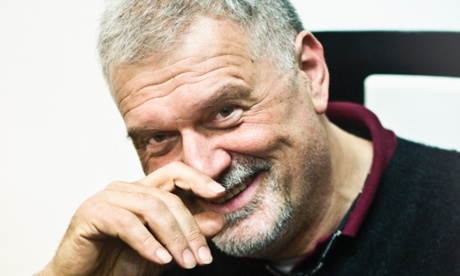
Italian horror composer Fabio Frizzi is one of the film soundtrack greats, his brooding, synth-powered compositions amongst the most memorable of the entire horror genre. This weekend, Frizzi will perform live at this weekend’s Illuminations festival in east London, where he’ll be playing excerpts from Zombie Flesh Eaters, Zombi 2, Seven Notes In Black and The Beyond backed by his F2F Orchestra and the Alauda String Quartet.
For Frizzi, a soundtrack is core to the cinema experience. “A soundtrack should enhance the flavours of a film, helping the viewer to experience the story fully,” he says. “In a horror movie the responsibility of the soundtrack is very strong. I believe that a great horror score should make sure that the viewer is not distracted ever, remain glued to the screen, with no possibility of escape.”
But what does the 63-year-old maestro make of the modern film soundtrack? We played him four recent specimens and asked him to cast judgment. While you read, take a listen to this exclusive one-hour mix from the UK soundtrack reissue Death Waltz, featuring past and present releases including Cannibal Holocaust, Lizard In A Woman’s Skin, The Raid and never-before-heard samples from Halloween 3.
Dev Hynes – Palo Alto (2014)
Fabio Frizzi: “As a father of two children aged nine and 14, I listen to a lot of new music. With his many pseudonyms such as Blood Orange and Lightspeed Champion, Dev Hynes is one of those artists who has always intrigued me. His music plays an essential role in Gia Coppola’s Palo Alto. He has a great quality to his voice, and he is capable of inhabiting old styles and making them his own, finding somewhere between traditional sounds and pop – a little retro, but very effective. I did some research about Hynes and found a funny link. In 2008, he was asked by the British Film Institute to perform the soundtrack of the cult Hal Ashby film Harold And Maude. When I made my first successful soundtrack in 1975, an Italian comedy entitled Fantozzi, I went to speak with the author, Paolo Villaggio, who also wrote the screenplay. We were looking to find shared tastes before we began our collaboration, and it turned out to be just that title, Harold And Maude, with the music by Cat Stevens.”
Mica Levi - Under The Skin (2014)
“Under The Skin is a film of intimacy and uncertainty. When director Jonathan Glazer was choosing who would record the soundtrack, I feel he made a strong decision in choosing Mica Levi. A young English composer, not yet 30 years old, she’s nonetheless explored a thousand worlds of music, and here opts for pure experimentation. As with all experimental electronic music, the addition of images is useful as a means of bringing the sound to a place of emotion. They can certainly help the listener to connect the sound texture to the world of sensations. The musical sequences written for this soundtrack evolve in a slow, sometimes seemingly imperceptible way. But applied to the images of the film, they create a mute emotion, a sense of internal, restless waiting. There is no right or wrong way to write a movie score, and every film has a life of its own. The system of the old cinematography is where I was born artistically. The work of Mica Levi is absolutely unconventional but also, for this reason, very charming to me.”
Hans Zimmer - Inception (2010)
“A thriller, tending to the fantastical – and of course an action movie. Nothing could be more further from the compositional world of Hans Zimmer, probably one of the most recognised heirs of the old American film music tradition. There are almost never big surprises in his scores, in the sense that Zimmer’s style is unique and only his. But it turns out great. He was one of the first composers to use electronic programming alongside the great symphony orchestra. This is traditional music in many ways, enriched with the sounds of the sequencer. The music always manages to keep the sense of scene, in pianissimo [very soft moments] and in moments of extreme action as well. An excellent score worthy of the great composer.”
Trent Reznor and Atticus Ross - Gone Girl (2014)
“I had heard of Nine Inch Nails, a very interesting project. But I learned more about this duo when they wrote the score for [David Fincher’s] The Social Network. Trent and Atticus create a captivating music, well thought-out in every way, and leaving nothing to chance. This soundtrack really hit me. The musical score is based on the creation of atmospheres from very clever musical constructions – a refined music, and in many ways bordering on easy listening. I think that all modern composers are working under a distant common influence, a musician we are talking about less nowadays. Vangelis taught us the importance of the essential in a soundtrack – a common thread, something simple that attracts you, be it a melody, a loop or an ostinato that you will remember easily. It is the magic of using keyboards, synth and computer as they made natural sound – as if it came from our veins or from our breath, a sound vital and alive. And among these reassuring, easy harmonies are rhythmic surprises that create a hiccup in the soul of the listener.”

